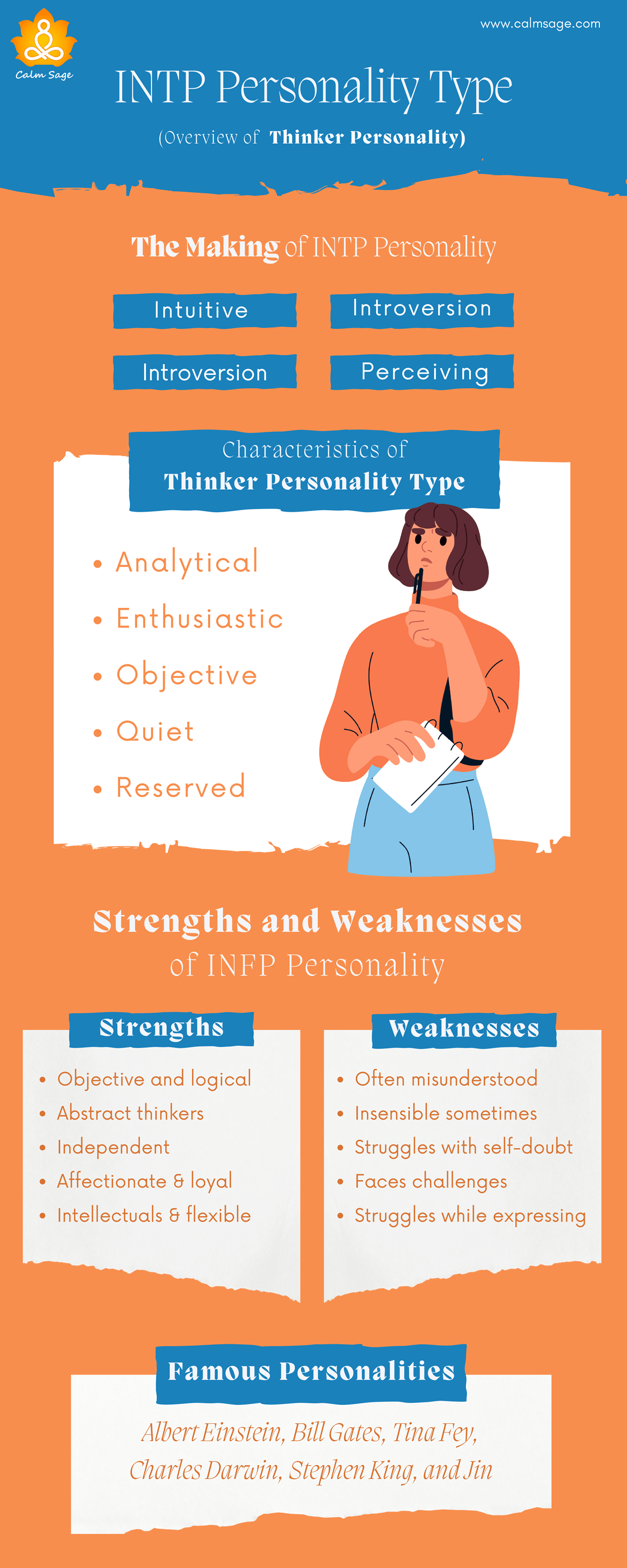Exploring Thinker Personality Type: Introverted, Intuitive, Thinking, And Perceiving (INTP)

Thinker personality includes introverted, intuitive, thinking, and perceiving (INTP). It is one of the 16 personality types identified in the Myers-Briggs Type Indicator (MBTI). INTP personalities can also be referred to as thinkers or logicians because their thoughts and actions are logic-based.
According to psychologists, INTPs are highly analytical and introverted which means they love spending alone time, thinking about analytical work, and working on solutions to their problems. Others say that introverts live in their own world, well, it’s true for INTPs or thinkers, they are too focused on their internal thoughts that they tend to ignore what’s going on in the external world.
Like other introverts, they also have a small social circle, however, they do have “their people” which is the best part about them. Can you think of a personality or loved one belonging to the INTP or thinker personality? If yes, comment down in the below section.
Do you know famous personalities like Albert Einstein, Bill Gates, Tina Fey, Charles Darwin, Stephen King, and Jin (BTS) identified as INTP personalities? Do you relate yourself or your loved one as an introverted, intuitive, thinking, and perceiving personality (INTJ)? Read this blog to know more about the thinker or INTP personality type from MBTI.
What is the INTP Personality Type?
INTPs are highly analytical and introverted which means they love spending alone time, thinking about analytical work, and working on solutions to their problems. INTPs are highly inventive and creative.
One of the important facts about INTPs is that they start thinking about ideas right after waking up and they keep on conducting full-fledged debates in their own minds. INTP has two subtypes which are INTP-A and INTP-T. INTP-A is referred to as the “assertive logician” because they are more comfortable and self-confident within themselves.
They are also self-satisfied with what they have. INTP-T is referred to as a “turbulent logician.” INTP-T is not as comfortable as INTP-A is. They are also less confident than INTP-A.

The Making of INTP Personality
- Introverted: INTPs enjoy spending alone time, especially after facing social situations.
- Intuition: INTPs love exploring new ideas and focusing on the big picture.
- Thinking: INTPs consider facts and analytical resources before making decisions.
- Perceiving: INTPs prefer spontaneity and flexibility while working.
Fact Check: INTP Personality Type
- According to studies, INTPs are also rare, only making up about 4.8% of the total population wherein 5.8% are males and 4% are females.
- INTP personality is mostly compatible with ENTP, ENTJ, and ESTJ. INTP personality is less compatible with ESFJ and ISFJ.
- Career options for INTP can be physicist, pharmacist, engineer, computer programmer, software developer, mathematician, geologist, and forensic scientist.
- INTPs are commonly found in technical or science occupations
- INTPs love attending cultural events, playing chess, writing, taking different classes, meditating, and backpacking.
Characteristics of INTP Personality
Below listed are some of the important characteristics of an INTJ personality:
- Analytical
- Decision-making skills are based on objective information
- Enthusiastic
- Flexible
- Focused on the big picture
- Honest and straightforward
- Imaginative
- Intellectuals
- Introverts
- Logical
- Loves theoretical concepts
- Objective
- Out-of-the-box thinkers
- Quiet
- Reserved
- Restricted by planning and structure
- Thoughtful
Strengths and Weaknesses of INTP Personality
Below listed are some of the strengths and weaknesses of an INTJ personality:
| Procedural Memory | Declarative Memory |
|---|---|
|
|
|
|
|
|
|
|
INTP Personality in Different Areas of Life
1. Relationship
Like other introverts, INTPs also have a small social circle which is why they are one of the most misunderstood personalities. They also need some alone time after facing social situations.
They often struggle with shyness, especially around strangers. They are open, friendly, and warm with their people. They mostly strike with their similar personalities.
Sometimes, they might seem detached or aloof because they often get lost in their mind which detaches them from the external world. INTPs are really great at extracting ideas based on their skills or knowledge.
When it comes to their relationship, they are tolerant and easygoing. However, they also tend to avoid other’s emotions or feelings because they mostly rely on logical or objective knowledge. INTP personality is mostly compatible with ENTP, ENTJ, and ESTJ. INTP personality is less compatible with ESFJ and ISFJ.
2. Career
INTPs enjoy abstract or theoretical concepts which means they really perform well in science-related options. They have strong reasoning and logical skills which make them think out of the box.
They are also creative thinkers, independent, and like autonomous working. INTPs are flexible as well; therefore, suitable careers for INTPs can be: Physicist, pharmacist, engineer, computer programmer, software developer, mathematician, geologist, and forensic scientist.
3. Friendship
Like other introverts, INTPs also have a small social circle; they often make great friends with people who are similar to them. If you are friends with an INTP, work on their emotions so that they can express them and you both can connect deeply over such conversations.
4. Parenting
INTP parents are logical, intellectual, flexible, and creative. This helps in fostering friendship with their children, however, in some cases; they might not be able to understand their children’s emotions.
With the help of the right parenting techniques, you will be able to achieve this as well. If you’re raising a child with an INTP personality, make sure you work together and develop intellectual interests mindfully.
I hope this blog helps you understand everything you wanted to know about INTP or thinker personality type from MBTI. Do not forget to share this blog with the people who strike your mind when you think of the thinker personality type.
Comment down and share your views on the same. For more such content, connect with us through all social media platforms.
Thanks for reading!




















